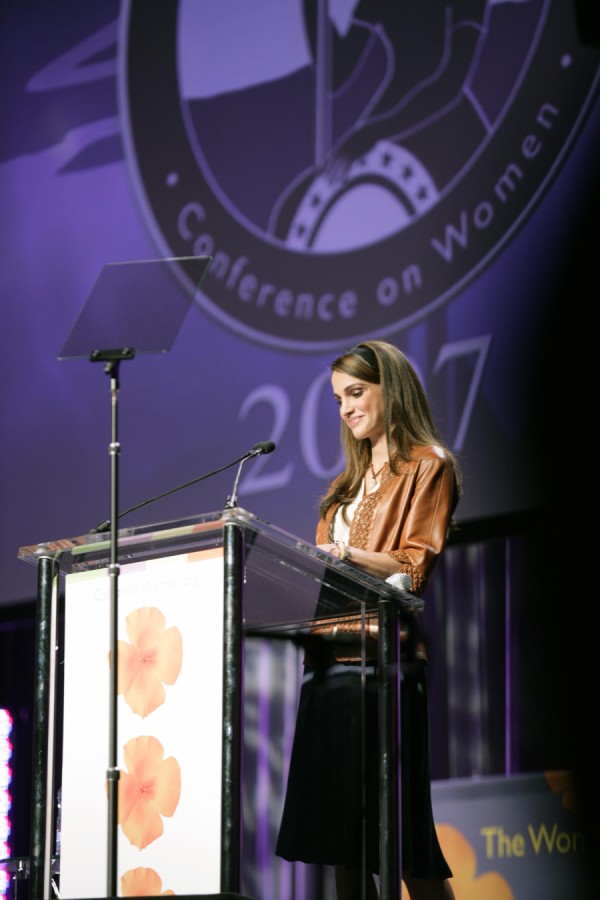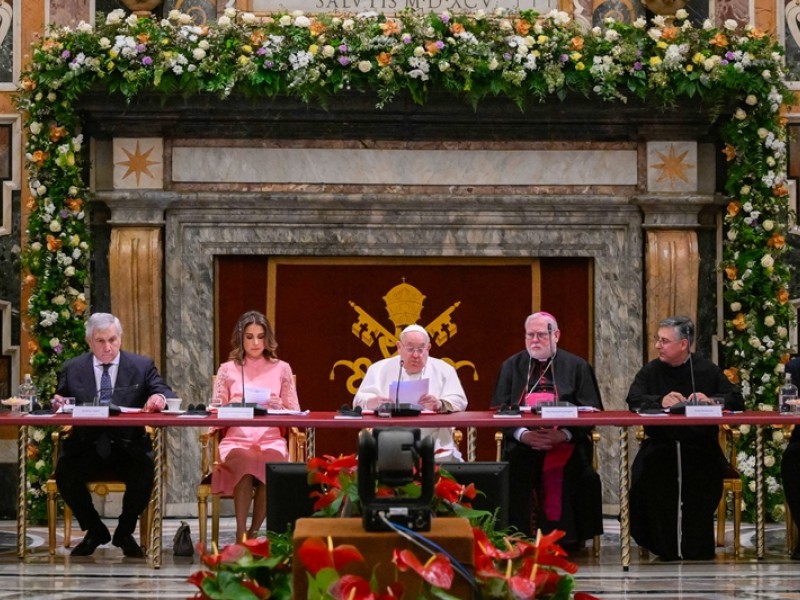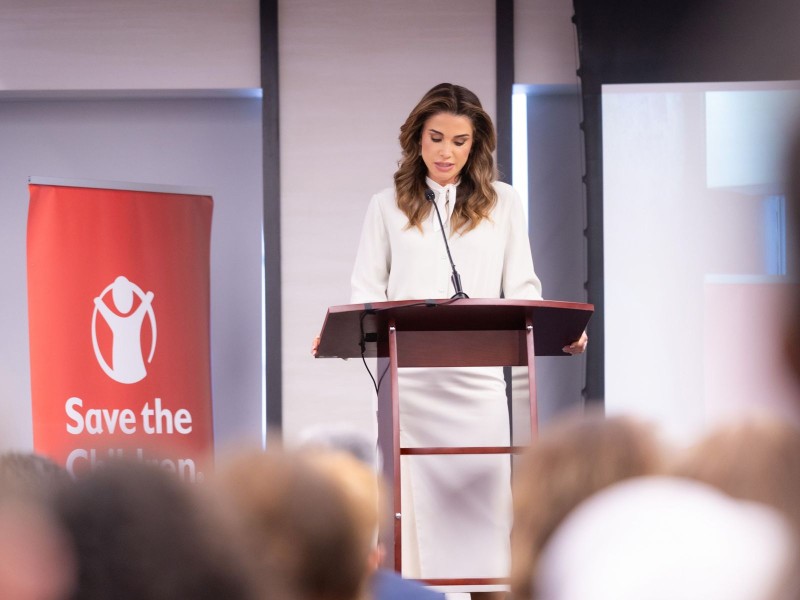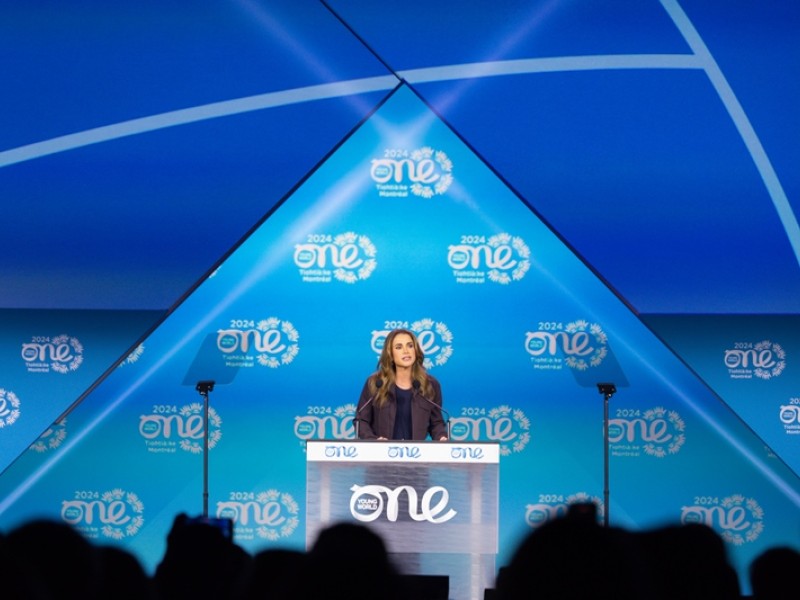Queen Rania's Speech at California Governor and First Lady's Women’s Conference 2007 - Long Beach, USA
California, United States

"Thank you Maria.
Before I start, on behalf of the people of Jordan, let me express my heartfelt concern for the citizens of southern California, as they battle atrocious and dangerous fires. And let me also pay tribute to the courage and tirelessness of the state's fire and police departments, the emergency services, volunteers and many others, who are all working around the clock...risking their own lives to save those of others. These people are real life, everyday heroes, and I think we should give them a round of applause to show our tremendous respect and admiration for the difficult job they are doing. God bless you.
Thank you all for making me feel so at home. As someone who comes from half a world away, I appreciate the warmth of your welcome. But I am not surprised, because yours is a state that has the entire world within its borders – a state that treasures diversity because you live it every day.
As an Arab and a Muslim, I am here today to share a message of cross-cultural understanding. And I am confident I have much to learn from you as well. Californians are proven champions of bridging cross-cultural divides. With no ethnic majority… more than 200 languages… and the daughter of such an iconic Democratic family married to a superstar Republican Governor… this state is clearly a fertile environment for cultivating common ground.
In our time together, I would like to share a few stories from my life so far.
And I hope that somewhere within my stories, you will hear something that sounds familiar.
Because I am convinced that we are all much more alike than we are different… that the experiences that shape us, no matter where we grow up, bring out the same very human responses – of tears and laughter, fear and courage, uncertainty and enlightenment.
My hope is that you will see part of yourself in me, just as I have seen myself reflected in other women’s lives around the world.
My first story takes place when I was five, in nursery school in Kuwait. It involves a quintessential product of American popular culture. And while I cannot say I learned everything that I really need to know in kindergarten, I did – thanks to this cross-cultural exposure – have what Oprah would have called an “Aha” moment.
My mother used to send me to school every day with my lunch in a lunchbox. Maybe your mother did that too – or maybe you are the mom getting up a little earlier than everyone else to pack up the fruit, cut off the crusts, and draw a smiley face on a note.
I still remember how good it felt to open up my lunchbox each day. I always knew I would find a hummus sandwich inside… and the familiar, dependable texture and taste that made me feel secure and loved.
One day, I sat next to one of my friends and watched her open her lunchbox. But what was inside? Not a hummus sandwich, but… peanut butter and jelly. And I thought – how revolting! Or, in my five-year old lingo, “Ewww gross!” I had never seen food so strange. In fact, I felt a real sense of pity for my friend, that she was stuck with some weird peanut paste, instead of my mom’s hummus.
And then one day, my friend suggested I might like to try her sandwich. I didn’t want to hurt her feelings, so I braced myself and took a small bite. Do you remember Scooby-Doo, how Scooby would literally float off the ground at the thought of a Scooby-snack? Well that was my reaction to peanut butter and jelly. I thought it was heavenly.
And maybe you have had an experience like that too, where something you thought was foreign and strange revealed itself to be wonderful. Or when a judgment you had made on the basis of looks turned out to be totally wrong.
Even a five-year old can start to grasp the importance of an open mind.
Now, I do not want to over-dramatize the impact of peanut butter on my life. But so often today, in a world grown smaller, we are forced to confront new things – new people, new cultures, new ways of behavior – that are different from what we are used to. And change can be scary. People often seek refuge by circling the wagons – clinging tightly to what they know and trying to wall out what they do not.
Yet, when we do that, we diminish ourselves. We deprive ourselves of life’s richness. And at worst, we perpetuate ignorance that breeds prejudice and fear.
I am afraid we are seeing that trend today in the tensions between East and West, with each side encumbered by stereotypes of what the other must be like. To hear some in the West, all Arab women are backward and oppressed… while some Arabs assume all American women are desperate housewives seeking sex in the city.
And some caricatures are not nearly as easy to laugh off… Arabs and Muslims as terrorists, for example, … and Americans as people whose ultimate aim is to suppress Islam.
If we are to get beyond stereotypes like these, we will have to really get to know one another. To taste the proverbial peanut butter – and hummus – instead of limiting ourselves to preconceptions.
And we should view this as a wonderful opportunity, not as a terrible burden. Because the more we try to stand in one another’s shoes and appreciate one another’s perspective, the more dimension, depth, and texture we’ll ultimately add to our own.
Now, let’s fast forward about 17 years. It’s 1993 in Amman.
Picture yourself as a fresh college graduate, embarking on your career.
You have got your bachelors degree in business … and a great job with Citibank. You’re looking forward to building on your education and experience.
Then, imagine you go to a party one night and you meet an incredible man. He’s dashing and kind… sophisticated and brave… handsome and humble. A real prince.
Well, in my case he was!
And all of a sudden, I found myself facing a future I had never prepared for. We all know the story of Cinderella. But real life is not a fairy tale.
It seemed overwhelming. I was just 22. I had had a normal childhood. My closest encounters with royalty had been in the pages of PEOPLE magazine. So you can imagine how anxious I felt when, shortly after I met my husband, my soon-to-be father-in-law King Hussein invited us over for lunch.
I have to confess, I envisioned a five-course banquet at a twenty-foot table. I was almost as nervous about using the right fork as I was about what I would say.
But I need not have worried. The King’s favorite food was take-out falafel and pita bread from one of those amazing little hole-in-the wall restaurants that only a local would know.
Now you may be thinking – this Rania has sure learned a lot of life lessons from sandwiches!
But it was quite an experience to be meeting the king over a casual meal of falafel, just like any other Jordanian family might serve, with no protocol or pretense.
And when I think back on that moment now, it underscores for me the importance of the first pledge we have taken today – of showing up in our lives as ourselves.
Because whatever title or office we may be privileged to hold, it is what we do that defines who we are. It is how we treat others. What values we embrace. What example we set for our children. Each of us must decide what kind of person we want to be, what kind of legacy we want to pass on. It is not the rank or the role that matters. And it is not what we have. It is what we give.
No one I know gave more of himself than His Majesty King Hussein. Some of you may remember nine years ago, this week, when the king interrupted his chemotherapy treatments, literally leaving his hospital bed, to attend the Wye River peace talks in Maryland.
He was so sick… so thin… and so frail. He had lost all his hair – even his eyebrows. And I am sure some of you have had to deal with cancer in your own family. You know what it is like to see someone you love in a battle for survival… to hold their hand in the doctor’s office… and hope against hope that medical research will find a miracle cure.
His Majesty was dying. Yet he was unyielding in his total commitment to peace – his determination to build a better tomorrow for all the children of Abraham. He breathed life into a quest for peace that many had thought was doomed. He ennobled those around him by the force of his great spirit. And that is what made him a king.
I am so proud that my husband, King Abdullah, is carrying on that legacy – relentlessly pushing for an end to the conflicts that have torn apart our region for too long.
You and I may never get the chance to weigh in on a treaty or at a summit. But each of us, in our own small realm, can be the ones who greet the world with open arms. We can be the ones who demonstrate, in the words of King Hussein, “that peace resides ultimately not in the hands of governments but in the hands of the people.” And we can teach our children that in our interdependent world, we have to be able to depend on one another.
The last story I want to tell is about a terrorist attack. Not 9/11, but 11/9. November 9, 2005 -- one of the worst days of my life… when suicide bombers struck three hotels in the heart of our capital city, Amman.
We lost 60 people that day, which in a country of just 6 million is the same proportion Americans lost the day the towers fell. In Jordan, we are a close-knit community. Everyone was touched by the tragedy. Everyone felt as though he or she had been personally attacked.
There was a wedding celebration in one of the hotels. The bomber targeted the reception. And in what should have been their greatest hour of joy, the bride and groom saw their fathers killed, their families literally torn apart.
I went to the hospital to try to comfort the victims and survivors. There was a woman in her 40s who had lost her only child – a 9-year old daughter she had tried for over 10 years to conceive. She kept asking me, “Why? Why did this have to happen?” And there was no answer to give. No words had the power to soothe her pain or lessen the scope of her sorrow.
If you had been there you would have wept with me, and our tears would have been indistinguishable, because there is no Arab way, no American way, of loving and losing a child. The voice of the heart needs no translation. The way we feel is exactly the same. Whatever we look like, wherever we live, however we pray, we respond to human suffering as human beings.
But we must do more than find unity in grief. We must also find a way to share our strength. In the past, I have described this as a reverse domino effect, where we reach out and lift one another up– each woman handing another the gift of hope… and encouragement… and resilience to be passed on.
But if our “reverse domino effect” is to reach its fullest potential, the chain of caring must reach from the West to the East and back again. In a shrinking world, we cannot afford to ration our compassion. More than ever, our fates are intertwined – and our friendship must know no boundaries.
I began by saying I knew that I had much to learn from Californians. And one of the things I will take home with me is Maria’s message about the “the power of WE” – a message of hope in a world too often divided between “us” and “them.” Let us work together to extend that community of purpose to all our peoples – Californian, Jordanian, American, Arab – joined in common values and common cause.
The words sound as sweet in any language:
نحن هم الذين ننتظرهم
We are the ones we have been waiting for.
Let us not wait any longer. It is time that both hummus and peanut butter sandwiches find their way into the lunchboxes of all our children, and generations to come.
Thank you very much."
Featured
Queen Rania's official website
This website does not support old browsers. To view this website, Please upgrade your browser to IE 9 or greater
Your browser is out of date. It has known security flaws and may not display all features of this and other websites. Learn how to update your browser



